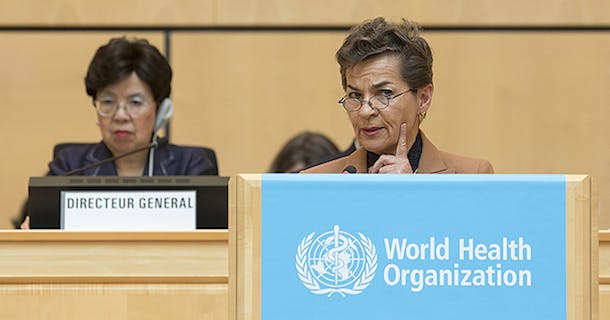
The 69th World Health Assembly, held last month in Switzerland, highlighted some of the world’s most pressing global health issues, including climate change – an issue that doesn’t always appear in global health conversations, but is directly linked to the health of people everywhere. Christiana Figueres, the United Nations Framework Convention on Climate Change (UNFCCC) Executive Secretary, addressed the assembly, devoting her discussion to the nexus between climate change and global health.
Figueres began her address by highlighting how the Paris climate agreement has broken several UN records: the most countries to convene to adopt an agreement, the most nations to agree to an international accord, and the most signatories to an international agreement in a single day. She urged the audience to help build on this momentum, which can improve global health.
In addressing the public health experts gathered at the assembly, Figueres explained that taking action on climate change will results in positive impacts on health – cleaner air, safer water, and more secure food supplies. Conversely, inaction on climate change will exacerbate current health crises, particularly climate’s impact on vector-borne diseases, which account for one-sixth of all deaths worldwide.
Figueres also noted the intrinsic connection between climate change and the Sustainable Development Goals, noting that the goals on health and climate change “are so intimately related, they cannot be separated.” She remains optimistic that progress on the global goals for sustainable development will mean progress for climate targets, and vice versa. Now is the time for action that explicitly recognizes the health–climate nexus, she noted, urging that “the health community needs a climate agenda.”
Figueres urged specific action in three areas:
- Leaders much translate why we need to act on climate change – for the health of the planet, and the health of the people;
- Leaders must strengthen the evidence base through growing research on the nexus between climate; and
- Global stocktaking of the Paris climate agreement every five years should include the positive impact that climate action is having on health.
In her closing, Figueres re-emphasized that we need urgent, ambitious action on climate change and called on the health community to continue to be advocates for climate action.
To learn more about the issues discussed at the World Health Assembly, read this blog post with our four key takeaways.
[Photo: WHO/L. Cipriani]



 View All Blog Posts
View All Blog Posts